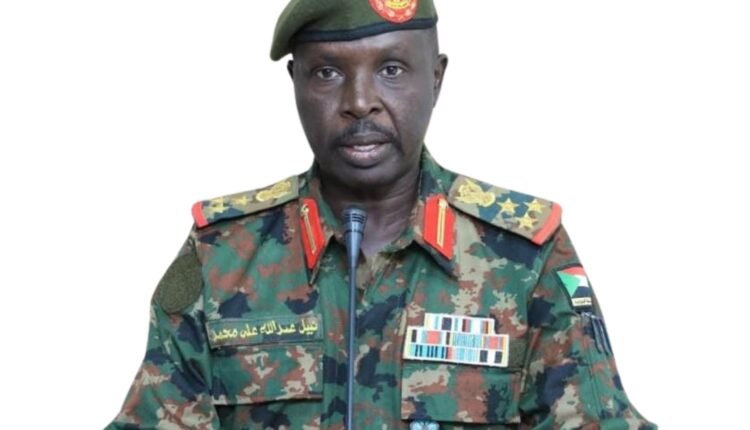On the Second Anniversary of the War: Sudan Armed Forces Spokesperson to “Sudanhorizon”: The War Started on April 13, and the First Shot Was Fired in Merowe

Interview by: Sabah Musa
As Sudan marks the second anniversary of the war, the country has endured devastating military, political, and economic events. The Sudanese people have suffered through one of the world’s worst humanitarian crises, with countless killed, wounded, displaced, and turned into refugees around the globe. For two years, Sudanese have lived through destruction and ruin at the hands of a rebel militia that has committed massacres and atrocities against unarmed civilians—amid international silence, which some perceive as complicity.
The war in Sudan has revealed that international human rights rhetoric and calls for justice are often just slogans, swept aside by the mass displacement of millions, the pleas of women, the cries of children, the humiliation of the elderly, and the killing of youth in this large, pivotal country. Beneath the surface lies a web of betrayal and regional and international agendas. The balance of power has shifted on the battlefield, and the Sudanese people have begun to clearly see who is friend and who is foe, both within and beyond the country.
Two years later, the militia that once besieged the capital Khartoum, occupied the Republican Palace and took over strategic areas—backed by substantial foreign support—has now begun its retreat, dragging the bitterness of defeat and the remains of its dismantled forces westward into Darfur. There, they kill, burn, and displace civilians, attacking displacement camps around El Fasher—perhaps a final attempt to seize the resilient city and complete their control over the five Darfur states. It seems to be a desperate bid to salvage something from a failed conspiracy, now widely recognized. In this context, Darfur appears to be the last nail in the rebellion’s coffin.
On the second anniversary of the war, Al-Muhaqqiq conducted an interview with Colonel Nabiel Abdullah, spokesperson for the Sudan Armed Forces (SAF), who is considered one of the heroes that endured the long siege on the General Command. He was both a witness to history and an actor in it.
Interview Highlights
Q: Where were you on the first day of the war?
A: On the first day of the war, April 15, 2023, we were at the General Command of the Armed Forces.
Q: You were under siege at the General Command for many months. How did you handle this on a daily and human level?
A: The details of those days will be told in the memoirs of commanders in the future, God willing.
Q: What was the army’s state of preparedness on that day?
A: Readiness levels had already been elevated following suspicious RSF (Rapid Support Forces) movements. They deployed forces to Merowe and mobilized units from across Sudan into Khartoum without any coordination with the armed forces. At the time, we sounded the alarm and informed the Sudanese people that these movements were unauthorised and uncoordinated with the SAF.
Q: In your view, who fired the first shot, and when?
A: I believe the first shot was fired on April 13, when the RSF defied clear instructions from the General Command to stop mobilizing and sending troops to Merowe. That was the real beginning of this ill-fated war. We observed the RSF concentrating forces in strategic areas across the capital—clear signs of their malicious intent to strike the country’s security and stability.
Q: But some say the first shot was fired at the Sports City in Khartoum on the morning of April 15?
A: What happened at the Sports City was merely a consequence of the prior RSF deployments. It was not the true beginning, which occurred earlier through their undeclared rebellion.
Q: How do you assess the stages of the war over the past two years?
A: The war began in the heart of the capital, in Khartoum, and even inside the General Command’s perimeter. Now, our forces have drastically changed the landscape, taken back control, and stopped the spread of the rebellion to other states. Most of Sudan has been cleared, and only a few regions in the west remain. We are committed, more than ever, to cleansing every inch of the national territory from this rebel militia. We know full well that this militia is a tool powerful regional actors use—providing them with money, weapons, and support. But, God willing, all this investment in destruction will backfire on them, leaving them with nothing.
Q: How do you evaluate the army’s current position?
A: We have now regained the upper hand and are in control across all fronts. I am confident, God willing, that we will fully liberate the country soon.
Q: Some suggest that after securing the central, eastern, and northern states, the army may not prioritise El Fasher and the rest of Darfur.
A: The armed forces are a national institution—they always have been and always will be. We’ve said repeatedly that our final goal is to cleanse the entire country, and we are actively pursuing that mission.
Q: Has the “Three Towns” capital (Khartoum, Bahri, and Omdurman) been completely cleared?
A: We have cleared Khartoum and Bahri entirely, and we’ve made significant progress in Omdurman. A few remaining pockets are being dealt with now.
Shortlink: https://sudanhorizon.com/?p=5160

